In one of the strangest cases in the Vatican in recent years, the Pope’s butler has been arrested for stealing documents from the Pope’s private quarters. But why did he do it? Meanwhile, at the Vatican bank…
By Robert Moynihan
This case keeps getting stranger — and even the partial answers, as they have trickled out, seem to open up more questions than they resolve. So for now we must try simply to chronicle what has occurred, without seeking to offer a definitive explanation for what has happened. All options are still on the table — and the real cause or reason for these events may not even have been guessed at yet.
The case has struck the papacy, and the Church, at a moment when the world’s financial, cultural and political situation cries out for thoughtful, wise leadership — the kind of leadership Pope Benedict could provide, and has been providing. And the case has broken just at a time when the Pope is taking an important decision about the future of the Society of St. Pius X, whether to embrace the Society, or leave it in its current state of semi-exile. It has broken, also, as world banking authorities are pressing Vatican officials to comply with international banking regulations that in a sense seem to intrude on the Vatican’s sovereignty. And it has happened at a time when Benedict is 85, and many are beginning to speculate about his possible successor; some in Rome attribute what has been happening, in part, to a “struggle for the succession.”
Through it all, Benedict continues to preach and teach as thoughtfully, as profoundly, as eloquently, as ever in his pontificate. He seems to be saying that, no matter what, he will not be moved — he will not abandon his mission.
As we were going to press, unexpectedly, the former head of the Vatican Bank emerged as potentially the gravest danger to the papacy.
Ettore Gotti Tedeschi, until the end of May the President of the Vatican Bank, had evidently stored a large number of Vatican bank documents in his home, reportedly containing information about financial misdeeds on the part of the bank. But these documents, by strange chance, have now fallen into the hands of Italian authorities, and Gotti Tedeschi is said to fear for his life.
In the first days of June, Italian police conducted a dawn raid on Gotti Tedeschi’s house and office. Investigators said they were looking for evidence in a graft case against defense and aerospace firm Finmeccanica, formerly run by a close friend of Gotti Tedeschi.
Instead, as it turns out, police stumbled upon an entirely different find. They discovered 47 binders containing private communication exposing the inner workings of the Vatican. This included financial documents, details of money transfers and confidential internal reports — all gathered by Gotti Tedeschi, allegedly, to build a convincing expose of corruption in the Vatican, to defend himself and his work.
A renowned economics professor, head of the Italian branch of the giant Bank of Santander, and a member of Opus Dei, Gotti Tedeschi took what turned out to be a “poisoned chalice” of a job in 2009, when he became the President of the Institute for Works of Religion, the formal name for the Vatican bank. His brief was formidable — to introduce transparency to an enterprise that was rumored to be exploited by criminal money-launderers around the world. After a tumultuous three years marked by in-fighting, Gotti Tedeschi was unanimously dismissed from his post by a board of Vatican officials at the end of May. “I have paid for my transparency,” the indignant banker said to the media, as he stormed off even before his dismissal hearing was over.
In an extremely unusual memorandum which was given to the Italian press by its author, Carl Anderson, an American who is one of the five members of the Vatican bank’s oversight committee (Anderson heads the Knights of Columbus, a 2 million-member American Catholic fraternal organization), the reasons for Gotti Tedeschi’s dismissal are listed. The reasons are many, and serious. But, why were they listed and then divulged to the press? Many observers say they have never seen such a rough dismissal note, and wonder why the Vatican did not offer Gotti Tedeschi a more dignified way of leaving his post. As it is, the “Anderson Memorandum” accuses Gotti Tedeschi of “progressively more erratic personal behavior” and “exhibiting lack of prudence and accuracy in comments regarding the Institute.”
“Aware that his crusade against corruption was failing, Gotti Tedeschi probably began to leak important documents to the media,” wrote one reporter covering this story.
The board that dismissed Gotti Tedeschi indirectly accused him of being behind some of the leaks, pointing to his “failure to provide any formal explanation for the dissemination of documents last known to be in the president’s possession.”
While the documents were a weapon with which to fend off his enemies, Gotti Tedeschi was also allegedly preparing a last resort option if the battle was lost — a “suicide belt” that would blow the lid off Vatican.
Several months ago, he reportedly told his friends that he had begun collecting an exhaustive dossier “in case something happened to him.”
It is this dossier that the police have now apparently discovered.
And the Vatican wants the folders handed back unopened.
“We have faith that the prosecutors and Italian judicial system will respect our sovereignty — recognized internationally — with regard to these documents,” said an official statement.
But Italian prosecutors have frequently been at loggerheads with the Vatican and have accused it of using its sovereignty as a shield against proper regulation. So, they are unlikely to willingly hand these documents back over to the Holy See.
If the documents do spark a legal firestorm, Ettore Gotti Tedeschi is sure to be a key witness in any trial.
Allegedly, Gotti Tedeschi kept a list of personal enemies in the Vatican — people who he had felt would stop at nothing to prevent him from reforming the Institute for Works of Religion. His friends have told the media he is now shaken and scared.
And Italian police are now considering putting the whistle-blowing banker under armed protection.
Meanwhile, the Pope’s butler…
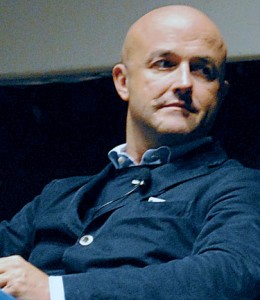
Gianluigi Nuzzi, Italian journalist and author of the book Sua Santità: The Secret Papers of Benedict XVI
The case began in January when letters, correspondence and working notes from offices close to the Pope began to be revealed in the Italian press. Since then, the information has continued to circulate, and in mid-May, a book was published (His Holiness: The Secret Papers of Benedict XVI, by Gianluigi Nuzzi) containing dozens of documents which tended to put the management of the Vatican in a bad light. On June 4, there were even released a few lines handwritten by Benedict XVI on January 20, 2012, appearing in the margins of a document, and reproduced in the Italian daily La Repubblica.
This affair has come to be called “Vatileaks” (literally, leaks from the Vatican) by the Italian press, from the revelations of matters on the website “Wikileaks” that rocked the United State government in 2010.
The arrest of the Pope’s butler, Paolo Gabriele, 46, on May 23 (it was made public on May 26), caught everyone by surprise. A trusted man, a close friend of the Pope, he was officially charged by the Vatican legal system of stealing numerous confidential documents and then leaking them to others for publication.
Gabriele had access to the most well-guarded rooms of the Apostolic Palace: the residence of Benedict XVI himself. He helped dress the Pope each morning, he served his meals, and he stood beside the driver of the “popemobile.”
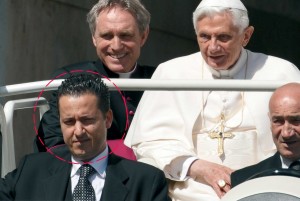
From left, Paolo Gabriele, papal butler, Msgr. Georg Gaenswein, one of the Pope’s two personal secretaries and Benedict XVI.
Gabriele, whom the Italian press characterizes as “tidy, elegant and discreet,” was recruited under John Paul II for this sensitive position and then entered into the service of his successor, Benedict XVI, in 2005. Present from the Pope’s rising at 6:30 am to his retiring to bed, and always at his side during his voyages and trips, he was, along with the Pope’s two private secretaries (priests), one of the few people to have personal and continual contact with the pontiff. At the Vatican, he was highly esteemed, respected, and considered as a servant without a history.
Currently he is the only person actually suspected of having reproduced and transmitted the documents. Despite the strong evidence against him, it has not yet been fully established that he had incriminating documents in his possession.
However, it appears that through this arrest, a network of “moles” working in the shadows for months may have been uncovered.
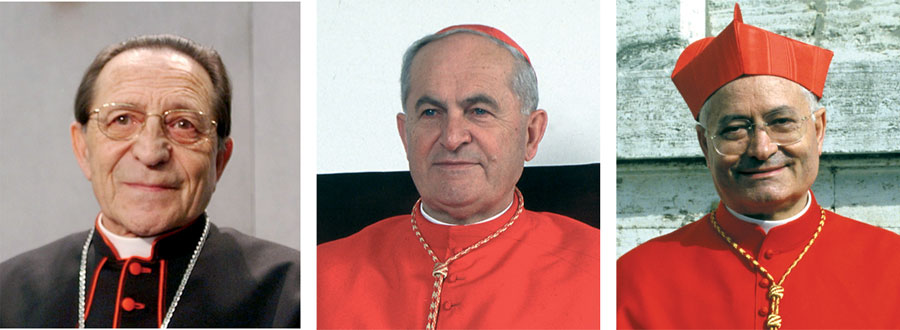
Special Investigation: The Pope In April named three cardinals to lead a special investigation of the “Vatikeaks” affair: Julian Herranz, Jozef Tomko, and Salvatore De Giorgi. Some observers say the Pope constituted this commission so that other cardinals in the Curia could be interviewed by them. The first meeting of the three was on April 24. Cardinal Tomko told Inside the Vatican, “We are working.”
According to Le Figaro, in an article dated June 4, 2012, Gianfranco Nuzzi, the author who revealed the leaks, says that five other people were interrogated during the last week of May. This is a matter for the gendarmerie and the Vatican commission of three cardinals in charge of the investigation, who are working independently, each according to his own methods, to scrutinize the 2,000 members of the Vatican administration.
In an anonymous interview granted to the Italian daily La Repubblica on May 28th, a man affirms that the Pope’s butler acted only as an underling. “The brain of the operation is not one; many people” are involved, indicates this discrete source who defines himself as one of “moles” who were informing Nuzzi. Among those constituting the collective brain of this destabilization operation can be found “cardinals, their personal secretaries, bishops and supporting knives,” said the anonymous informant, without providing evidence of the truthfulness of his statements.
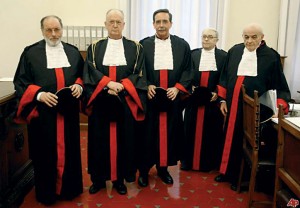
From left, Vatican court prosecutor Piero Antonio Bonnet, president Giuseppe Dalla Torre, prosecutors Paolo Papanti Pellettier, Pierfrancesco Grossi and chief prosecutor Nicola Picardi.
As for the official communication from the Vatican, for now they have neither “an Italian cardinal,” nor a “female” leader of “a group of ‘moles’,” as insinuated by a portion of the Italian press. However, Fr. Federico Lombardi, the Director of the Holy See’s newsroom, acknowledged that the commission of cardinals established by Benedict XVI last April would hear several people, “among whom are cardinal directors of curia offices.”
Indeed, even the author of the revelations, Nuzzi, does not know the principals responsible for the operation. By his own admission, he has only met one member of this secret network, charged with putting together some documents to supply the substance of his book.
In some points reprised on the Figaro website, Nuzzi reported that his informant had revealed to him the motivations of the group: “We met each other while living or working in the Vatican and realized we shared the same perplexity, the same criticisms. We were frustrated to find ourselves powerless before too many injustices, personal interests, hidden truths. We are a group that wants to act. (…) No one knows everyone else. (…) When these documents are published, the reform work begun by Benedict XVI will experience an inevitable acceleration.” For its part, the Italian daily La Repubblica quoted another source who believes that “it is to bring out what is rotten in the Church in recent years, from 2009-2010.”
The reason for the opposition of the “moles” to the Cardinal Secretary of State Tarcisio Bertone is that they judge him to be “authoritarian.”
They accuse him of centralism, and to “not to be worthy” of his position. They also oppose the “old guard” of prelates formed at the diplomatic school of the Vatican, and faithful to Cardinal Angelo Sodano, dean of the College of Cardinals.
At stake in these struggles, say some Vatican watchers, is nothing less than the preparation for the next conclave to choose the successor to Benedict XVI.

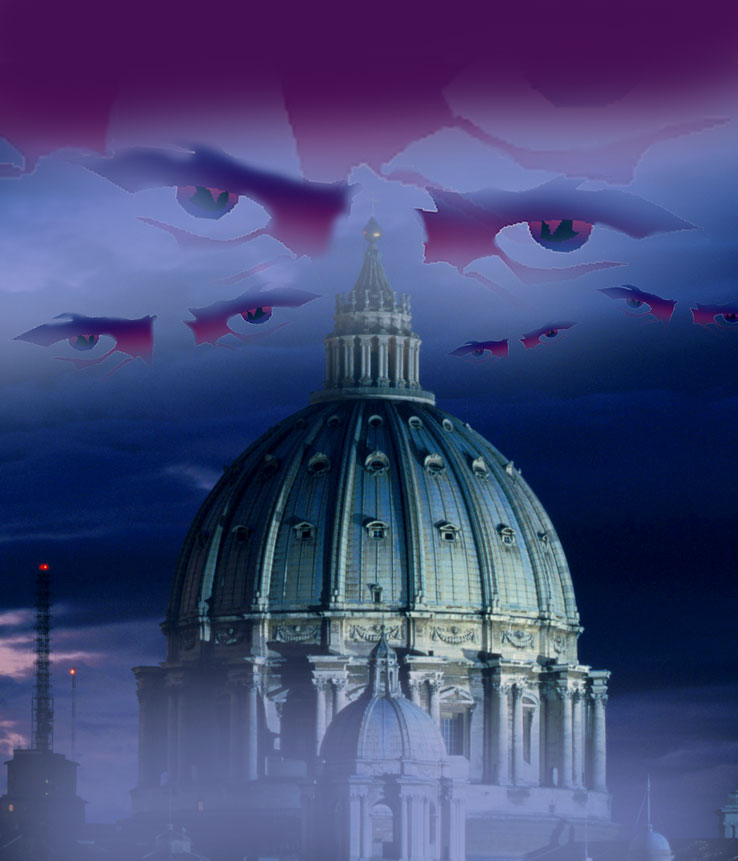
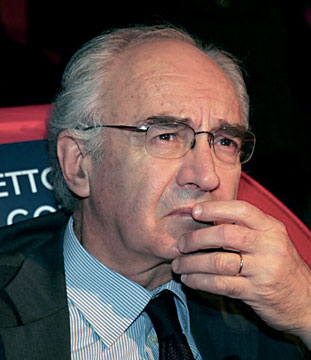
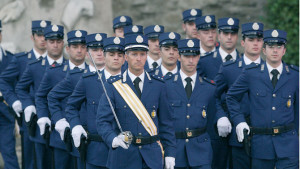

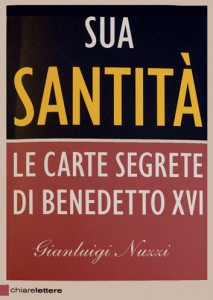
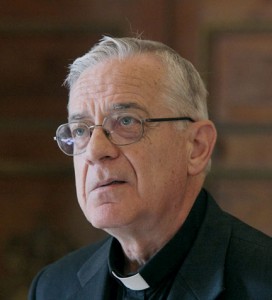

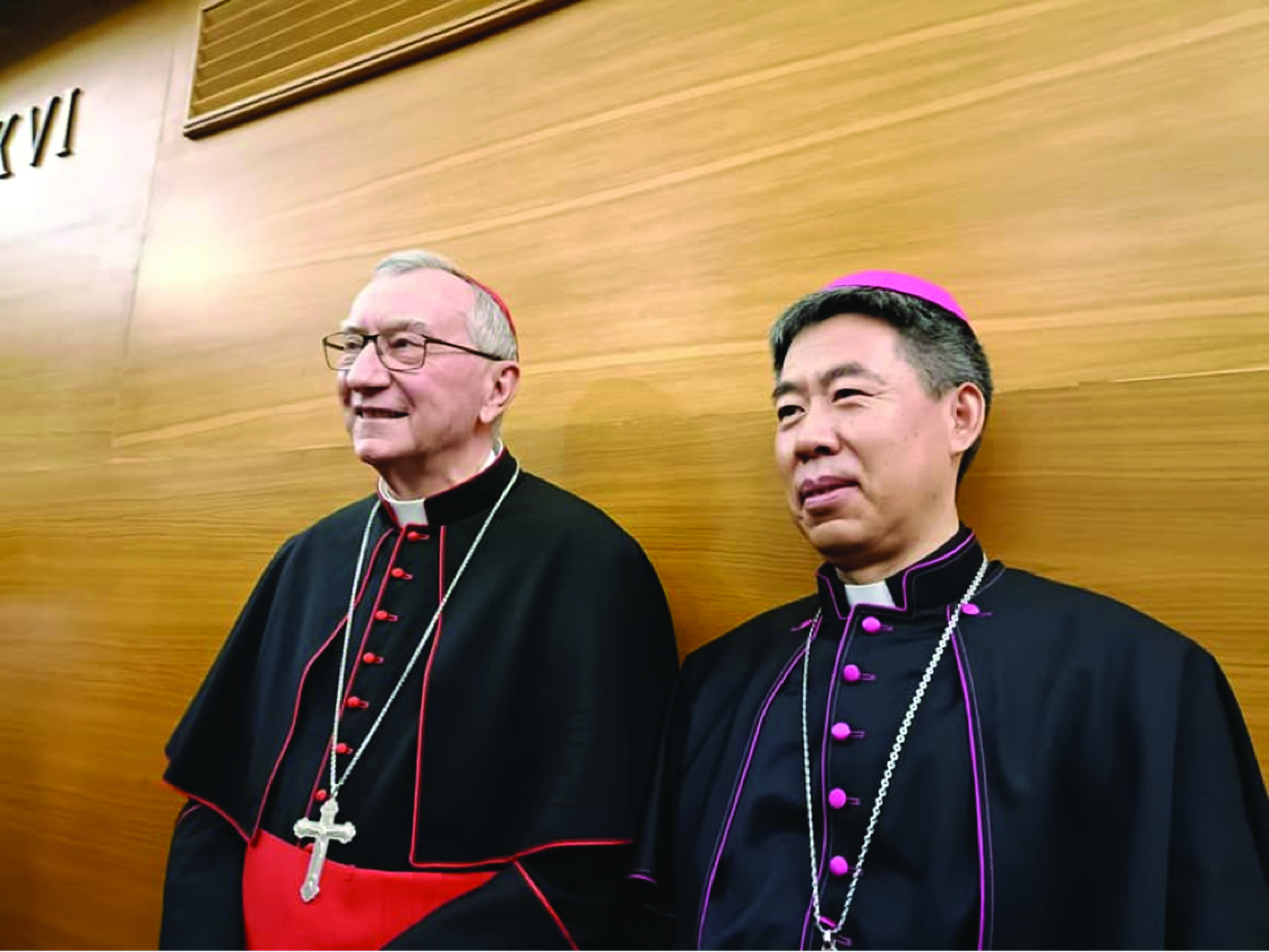
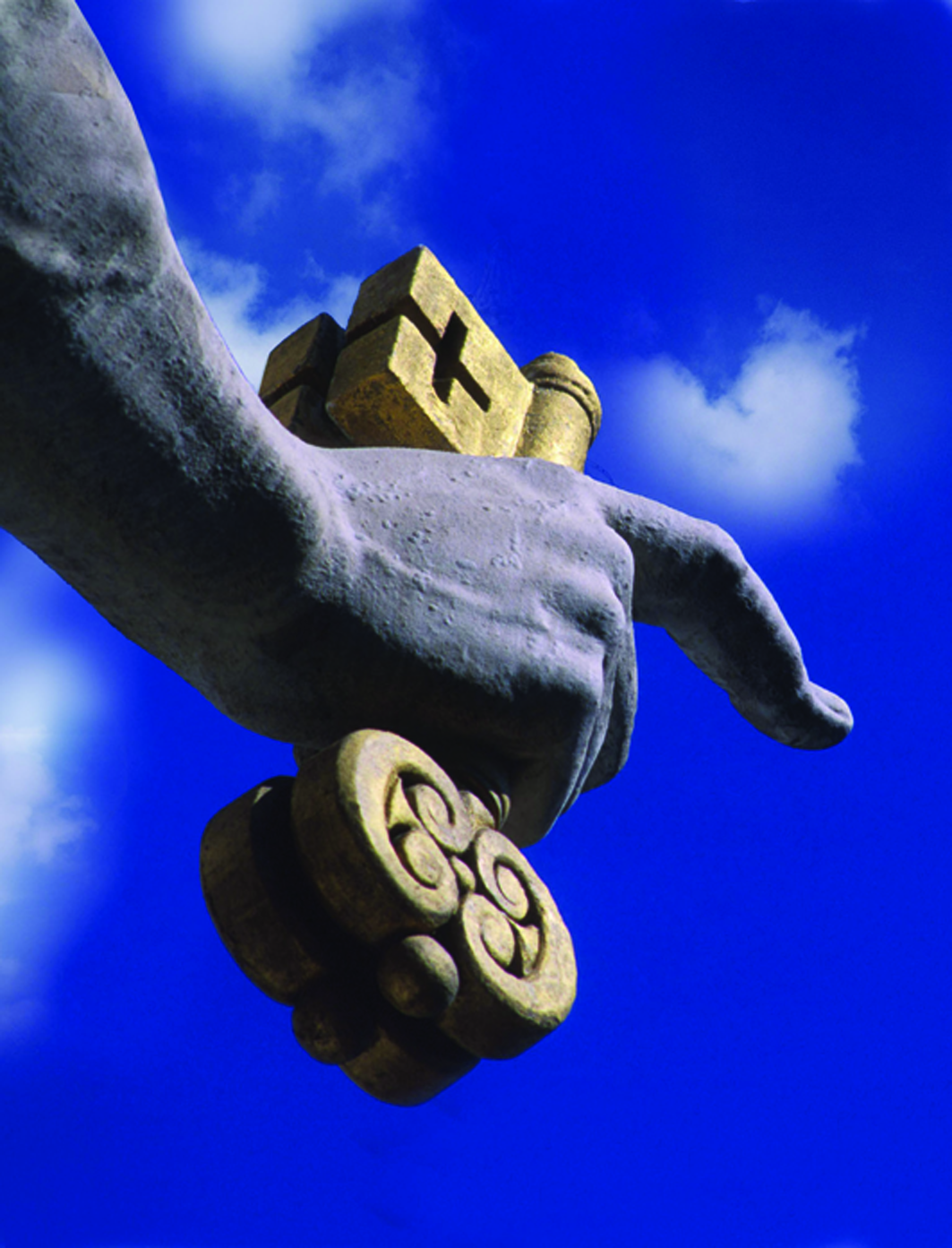

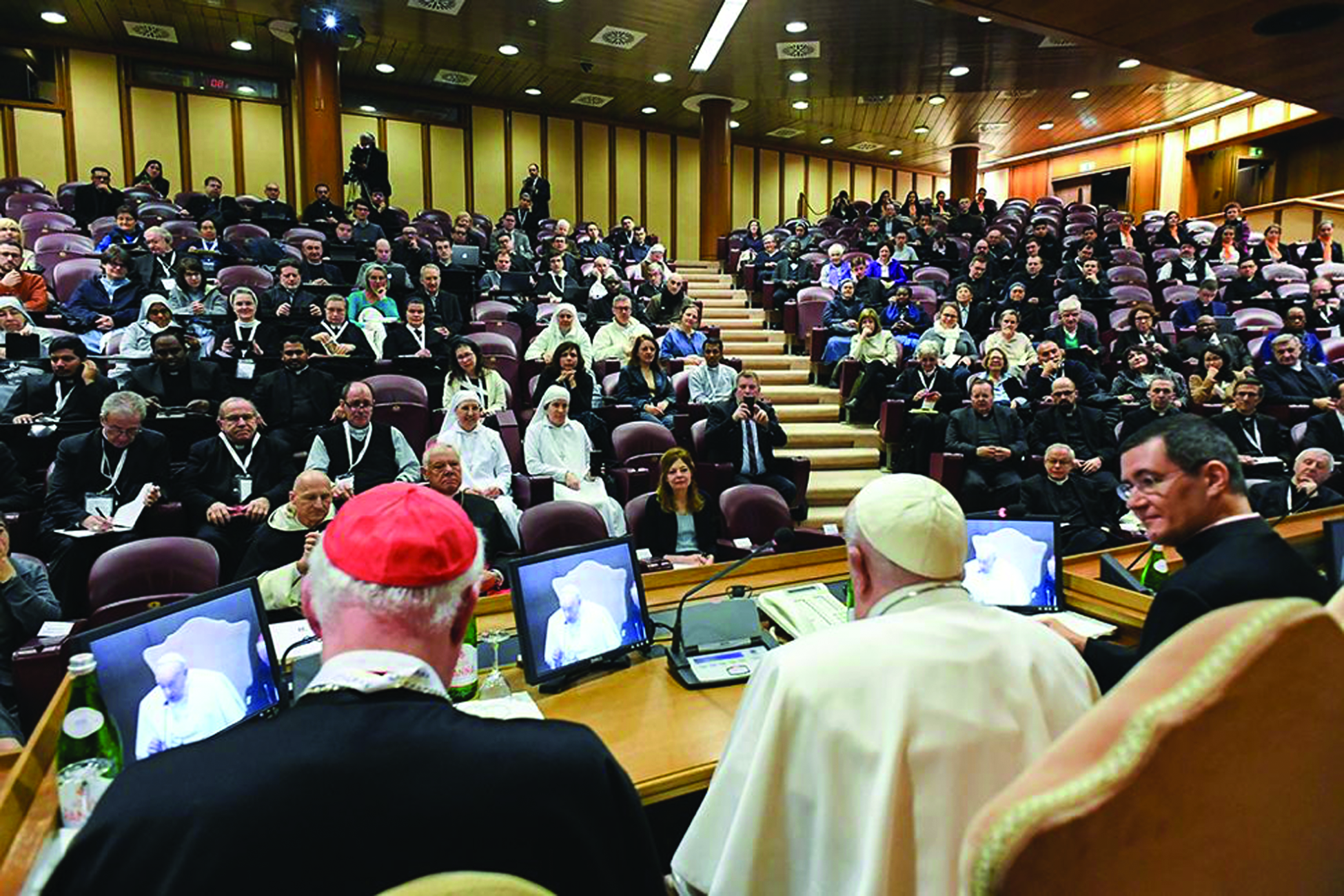
Facebook Comments